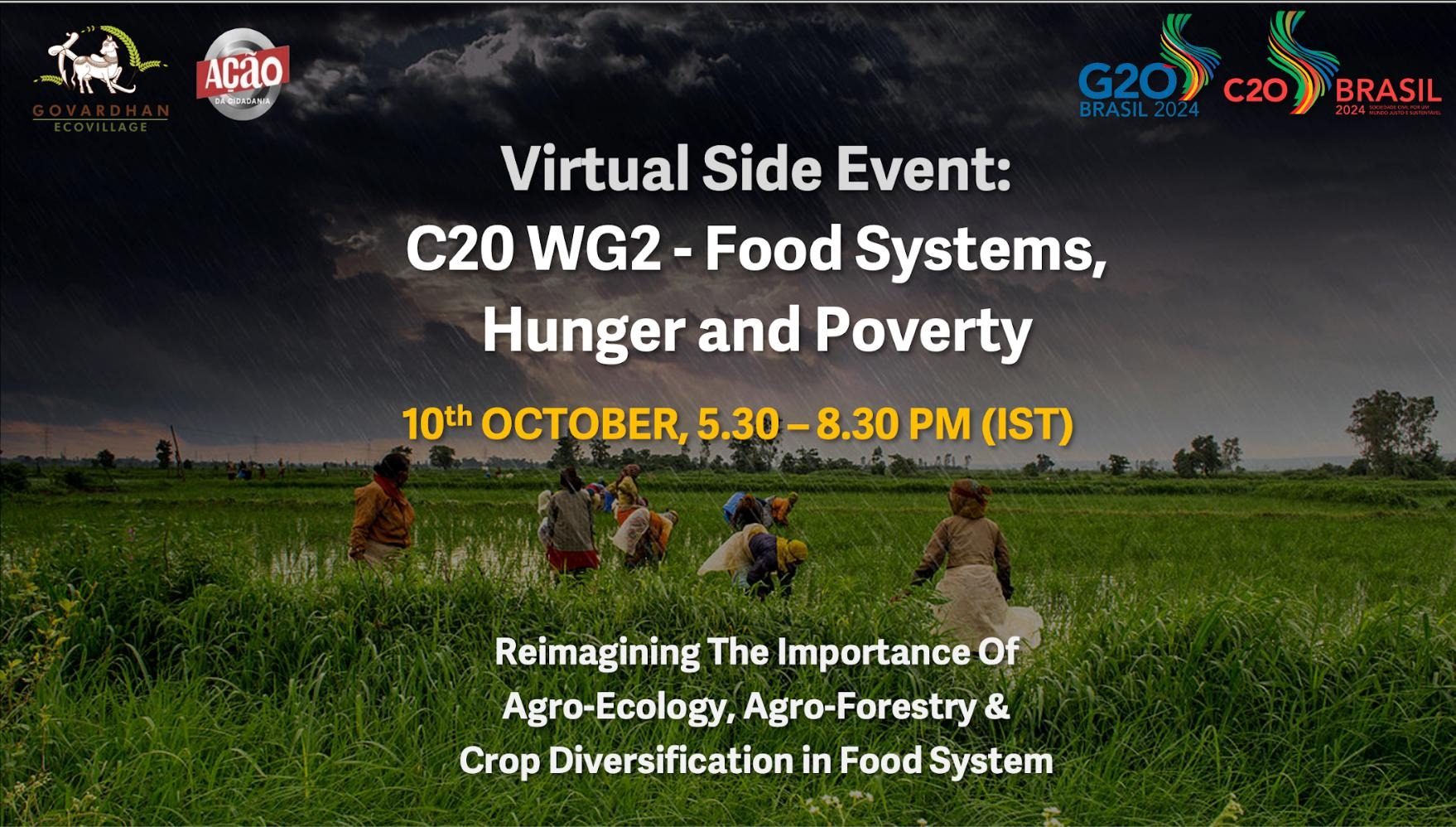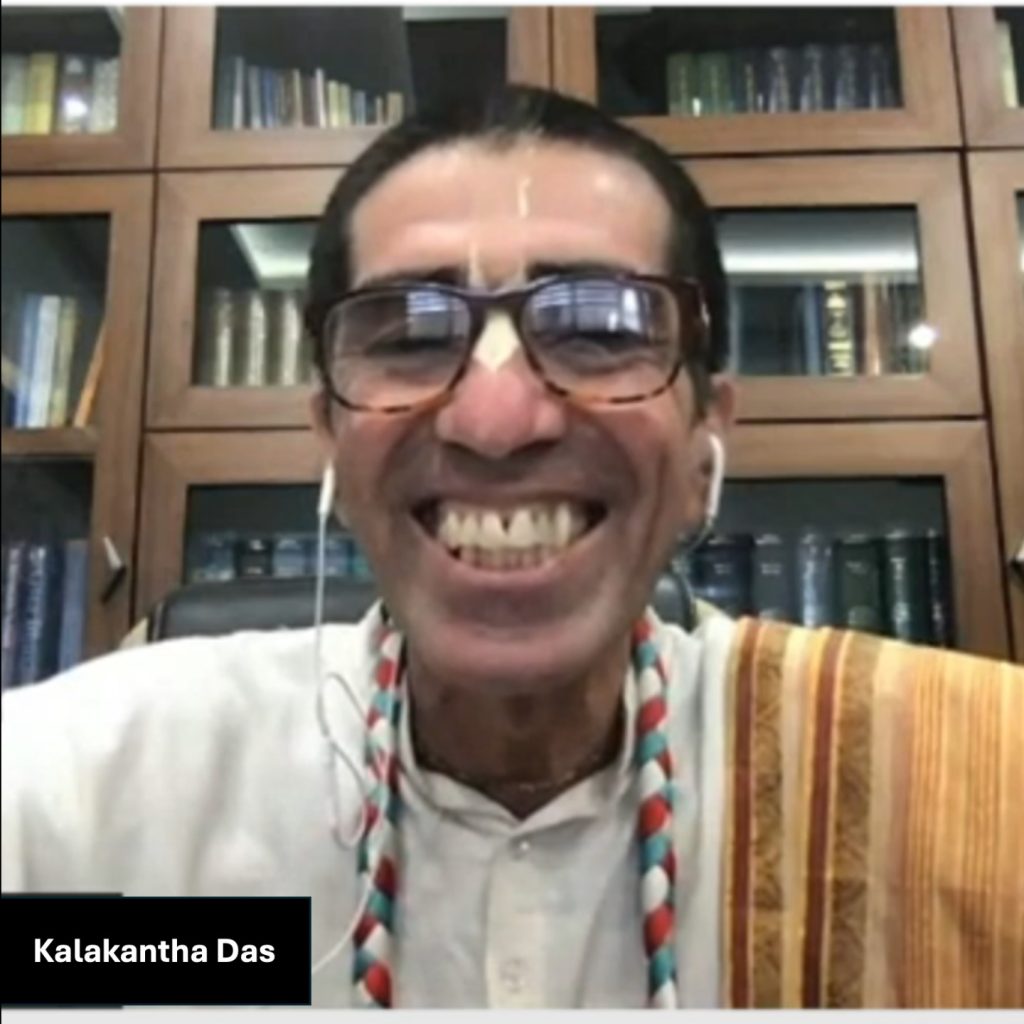Kalakantha Das Explores Spirituality and Sustainability at C20 Conference
By Gandini Devi Dasi (Monica Dabos), Communication Coordinator for ISKCON CP&A Ministry | Oct 15, 2024

On October 10, 2024, Kalakantha Das, the GBC Minister of Cow Protection and Agriculture, delivered an impactful presentation at the Virtual C20 Conference, a side event focusing on food systems, hunger, and poverty. He emphasized that integrating spirituality into agroecology, agroforestry, and crop diversification is essential for addressing global food challenges and environmental crises. By highlighting the interconnectedness of spirituality, nature, and sustainable agriculture, Kalakantha Das presented a holistic approach to solving these pressing issues.
The C20 (Civil 20) Conference is a platform for civil society organizations to engage with the G20 (Group of Twenty) nations. The G20 is an international forum for governments and central bank governors from 19 countries and the European Union. It addresses major issues related to the global economy, such as international financial stability, climate change mitigation, and sustainable development. The C20 Conference brings together various stakeholders to discuss these critical issues and provide recommendations to G20 leaders.
Kalakantha Das began his presentation by expressing gratitude to the organizers and participants, emphasizing the importance of integrating civil society into G20 discussions. He highlighted ISKCON’s global outreach, including its 65 eco-villages and farms, which are internationally recognized for their efforts in cow protection and sustainable agriculture. He underscored the pivotal role of the Govardhan Eco-Village in spearheading this event, both in India and this year in Brazil.

Kalakantha Das highlighted the following key points:
Spirituality as a Solution: Kalakantha Das explored the interconnectedness of spirituality, agroecology, and ancestrality, asserting that spiritual values are crucial for addressing global crises at their roots. He emphasized that food systems, hunger, and poverty are deeply intertwined with inner crises of greed and apathy, which are at the core of our environmental crises and manifest globally through the actions of mega-corporations. These issues, he argued, must be addressed through spiritual awakening. Quoting Gustav Speth, a member of the Conscious Food Systems Alliance, he reinforced the need for a spiritual and cultural transformation to tackle environmental issues such as biodiversity loss, ecosystem collapse, and climate change. Kalakantha Das urged the audience to recognize the spiritual thread that connects various aspects of life and to harness this thread to address systemic problems.
Learning from Nature and Tradition: Drawing from the wisdom of traditional practices and the functioning of natural ecosystems, he advocated for agroecology and agroforestry as sustainable methods. He explained how ancient organic practices, like those observed by Sir Albert Howard in India, can guide modern agricultural practices to be more holistic and environmentally friendly. He delved into the concept of agroforestry, drawing parallels between the natural growth stages of forests and sustainable agricultural practices. Highlighting the sacredness of forests and the wisdom of ancient sages, he advocated for replicating these natural processes to foster environmental resilience and abundance.
Community and Unity: Kalakantha Das stressed the importance of community in achieving sustainable development. He pointed out that just as a forest thrives through the interdependence of its diverse elements, human societies must foster unity and cooperation to tackle hunger and poverty.
Role of Spiritual Practices: He described how spiritual practices can instill a sense of sacredness and responsibility towards nature, leading to more sustainable interactions with the environment. He referenced the Vedic tradition of revering rivers and animals, such as the sacred treatment of cows in India, as models for fostering a deeper connection with nature.
One Health Approach: Emphasizing the interconnectedness of human, animal, and environmental health, Kalakantha Das advocated for the One Health approach. This holistic perspective ensures that agricultural practices not only focus on productivity but also on maintaining the health of the entire ecosystem.
Sir Albert Howard became the father of organic farming, promoting the principle that the health of the soil, plant, animal, and human are interconnected. This not only aligns with the “One Health” approach being discussed by the UN and FAO today, but it could be the starting point in history when this spiritual holistic approach was widely broadcast.
Another key concept is the recognition of “personhood” in nature, like the Ganges River in India, which is seen as a legal person with rights similar to those of humans. This attribution of sacredness to natural entities mitigates to some degree the propensity to exploitation. It can be an antidote to ego/human centrism by simply adding a face to what would be generally seen as an impersonal resource. Such a vision has led to environmental destruction. He advocates for portraying natural resources as sacred beings rather than mere commodities, which can play a role in spiritual traditions to instill respect and care for the environment.
He concluded by reflecting on the visionary ideas of Bhaktivedanta Swami, ISKCON’s founder, who advocated for eco-villages, local economies, and sustainable agricultural practices long before the mainstream discussion on climate change. He shared examples of successful community-driven agricultural initiatives from Brazil and India, demonstrating the transformative power of selfless service and spiritual values.
The C20 event, with its focus on agriculture and environmental sustainability, provided a platform for meaningful dialogue and the exchange of ideas, including integrating spirituality into discussions. ISKCON remains committed to promoting sustainable practices that honor both the environment and spiritual principles.
The conference featured various distinguished speakers, including Dr. Sunita Pandey, from the Southeast Asia Agri-Foundation, elaborated on the sacredness of forests, and many others who discussed educational and extension initiatives in agroecology.
Kalakantha Das concluded his presentation by calling for a revival of traditional wisdom and spiritual values to create a more sustainable and equitable global food system. He congratulated the organizers and participants for their efforts in bringing these critical issues to the forefront of the G20 discussions. To listen to the presentation, click here.
For more information about the event and ISKCON’s initiatives in cow protection and agriculture, click here.















